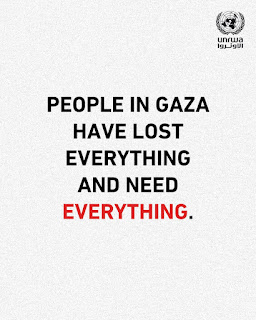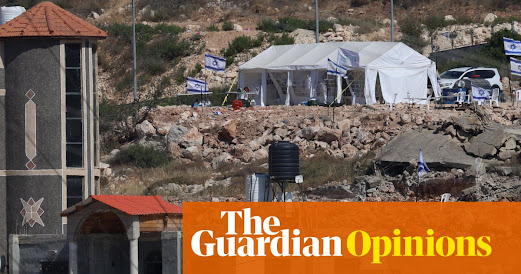https://x.com/ezzingaza/status/1930360856589566428
https://x.com/ezzingaza/status/1930360856589566428
 |
Every day, millions have access to every single thing they need.
But in #Gaza, essentials like toothbrushes, sanitary pads, and soap are unavailable.
Access to basics is a right, not a privilege. |
 |
| UNWRA WORKS |
 |
“Buying Time For Genocide.” The US & Israel never wanted a ceasefire — blocking efforts for months while the US kept supplying weapons. In the latest talks, Trump’s envoy Steve Witkoff helped Israel strip all guarantees to end the genocide. #ARMSEMBARGONOW |
 |
| May 15 2025 marks 77 years since the Nakba—amid ongoing Israeli genocide in Gaza and intensifying violence across Palestine. Our new visual with traces Gaza’s history of enclosure, shaped by British colonialism and sustained by Zionist settler colonialism. #Nakba |
https://visualizingpalestine.org/visual/killing-the-story-april-2025/
 |
This visual in our series on anti-Palestinian racism captures the dehumanization of Palestinians in mainstream media, where they are constantly silenced, discredited, and excluded. Anti-Palestinian racism is one tool that reinforces a structure designed to weaken Palestinian resistance and narrative, and obscure global awareness of the Palestinian struggle for justice and liberation. Explore the other three visuals in the series, one of which offers a framework for recognizing Anti-Palestinian racism as a distinct form of racism, The other visual highlights case studies from primary and secondary education. The third highlights case studies of anti-Palestinian racism on college campuses. https://visualizingpalestine.org/visual/anti-palestinian-racism-in-the-media/ |
 |
| ‘We must stop this war immediately, before this violence grows and spreads further, consuming even more innocent lives in its monstrous path.’ Photograph: David Zalubowski/AP |

This must stop. Two incidents of political violence, both targeting groups of Jewish people, are two incidents too many. Less than two weeks ago, a gunman shot and killed two Israeli embassy staffers in Washington DC, yelling “Free Palestine” as he was being detained. This week, a man used a “makeshift flamethrower” along with other incendiary devices to attack a Boulder, Colorado, rally organized by Run for Their Lives, a group which organizes events “calling for the immediate release of the hostages held by Hamas”. Eight people were injured in this latest assault, at least two of them seriously.
These horrific acts will no doubt increase the anxiety many Jewish people have about increasing – and increasingly violent – antisemitism in the United States. Understandably so. Antisemitism must not be given any oxygen to breathe. One can oppose Israel’s 600-plus day war, relentlessly pounding the innocents in Gaza, while vigorously opposing all forms of antisemitism. In fact, one must oppose both. Such is our duty to each other in a civilized world.
And as we have a duty to call out antisemitism when we see it, we also have an equal duty to remember that Palestinians, Arabs and Muslims have also been subjected to extreme forms of violence and bigotry in the United States since the beginning of this terrible war. And while we are certain to hear much about today’s rising antisemitism in the coming days, as we should, we must also make sure to acknowledge the rising threats against Palestinians, Arabs and Muslims.
Consider what happened to Wadea al-Fayoume, a six-year-old Palestinian American boy. Wadea was murdered in October 2023 by his landlord, who stabbed the young boy 26 times in his home in Plainfield Township, Illinois. The landlord also attacked the boy’s mother, Hanan Shaheen, stabbing her over a dozen times while telling her “you, as a Muslim, must die.” Joseph Czuba, 73, the landlord, was found guilty of murder, attempted murder, and hate crime charges last month and sentenced to 53 years in prison.
Or there are the three Palestinian friends, all college students, who were out for a stroll in Vermont during the Thanksgiving long weekend in 2023. They were gunned down in what many are assuming is a hate crime. The three were speaking a mixture of Arabic and English and were sporting keffiyehs, and one of the three, Hisham Awartani, is now paralyzed from the neck down due to the shooting. The alleged assailant, Jason Easton, is currently on trial for the shooting.
And there’s the time, in May 2024, when a woman attempted to drown a three-year old Palestinian girl in a swimming pool in an apartment complex in the Dallas-Fort Worth suburb of ... READ MORE https://www.theguardian.com/commentisfree/2025/jun/04/antisemitic-and-islamophobic-violence-is-rising-in-the-united-states-both-must-stop
[AS ALWAYS PLEASE GO TO THE LINK TO READ GOOD ARTICLES (or quotes) IN FULL: HELP SHAPE ALGORITHMS (and conversations) THAT EMPOWER DECENCY, DIGNITY, JUSTICE & PEACE... and hopefully Palestine, or at least fair and just laws and policies]
ALSO READ in The Guardian
Jews don’t want to be played by the left or the right. We don’t want to be pawns tossed back and forth. We want to be safe. We want to be heard. We want to be seen in our diversity, as would any people. We don’t want our lives to be at risk. Listen to and watch what each person says. See each person as an individual. Please build a serious political program that doesn’t cancel or promote violence of any kind but rather lifts up the hopes and desires of everyone. The alternative is deadly."
 |
| Tents set up by Israeli settlers near the West Bank village of Bruqin, west of Salfit, 23 May 2025. Photograph: Alaa Badarneh/EPA |
Each of the 22 illegal settlements approved by Israel last week is another nail in the coffin of the peace process, hammered in by the complicity of western governments and corporations. Israeli settlements are not benign civilian neighbourhoods – they are primary instruments of dispossession, control and apartheid. Settlements are closed militarised zones on Palestinians’ stolen land, cutting off our access to our resources, our farms, our schools, our jobs and each other. Palestinian lands rapidly shrink, our livelihoods are devastated, our rights are systematically violated and our identity is undermined.
Western lawmakers look on, expressing commitment to peace through a two-state solution but choosing to do nothing to achieve this goal. Instead, their policies and inaction enable yet further settlement activity.
In the West Bank we live in an obvious two-tier system, yet most lawmakers continue to shun the word “apartheid” despite Palestinian, Israeli and international human rights organisations concurring on its accuracy and the international court of justice (ICJ) reaffirming it last July. The Settlers, the BBC documentary by Louis Theroux, helped expose this reality, showing me being prevented from even walking on the same streets as Israelis in the neighbourhood of Hebron, where I was born.
In response to the documentary, Israeli settlers and soldiers broke into my yard, vandalised it and assaulted me. Soldiers made no arrests but instead threatened to arrest me if I filed a complaint. Then one morning at 4am, young settlers made a bonfire on private Palestinian land outside my home and chanted that they hoped to see me killed. One individual showed up right in front of my house in army fatigues and with a semi-automatic rifle to intimidate me. Settlers then stole my pan-African flag, given to me by Black Lives Matter, and burned it among a pile of Palestinian flags.
It is the same story in nearby Masafer Yatta, featured not only in The Settlers but also in the Oscar-winning film No Other Land. Directors Basel Adra and Yuval Abraham called for interventions last week to help stop its destruction, and co-director Hamdan Ballal was detained and beaten in reprisal for its production.
The ICJ found Israel responsible for the crime of apartheid, yet western leaders bite their tongues. It found that not only Israel’s settlements but also its whole occupation of the West Bank, including East Jerusalem, and the Gaza Strip are unlawful, and that the international community is obliged to help dismantle the settlements, evacuate the settlers and end the occupation as quickly as possible. Why are western leaders inert?
It seems that western governments would rather undermine the international justice system than hold Israel to account... READ MORE https://www.theguardian.com/commentisfree/2025/jun/03/israeli-settlements-west-bank-international-law-illegal[AS ALWAYS PLEASE GO TO THE LINK TO READ GOOD ARTICLES (or quotes) IN FULL: HELP SHAPE ALGORITHMS (and conversations) THAT EMPOWER DECENCY, DIGNITY, JUSTICE & PEACE... and hopefully Palestine, or at least fair and just laws and policies]
.webp) |
| Smoke rises following an Israeli airstrike in Jabaliya refugee camp, northern Gaza Strip, on May 27, 2025. (Photo by Mahmoud Zaki/Xinhua via Getty Images) |
Living in Jabaliya had become impossible. By stripping us of our health and money, ongoing displacement has forced changes on us: from being a proud family to one that lives in humiliation. We were pushed south last month, during Israel’s fourth invasion of Jabaliya in mid-May. In preparation for yet another ground invasion, the Israeli military started pounding Jabaliya with airstrikes, leveling buildings to the ground. Israeli troops began advancing from the north and the east, getting closer every day.
I started looking for a home to rent in western Gaza City, where it was somewhat safer and where we could find some kind of shelter. On May 20, while returning from that search, my father called me in a panic to say a quadcopter was firing heavily at our home in the western Jabaliya camp. Our time was up. We had to flee. So we decided to spend the night at my brother’s burned down house in central Jabaliya.
We figured we would stay the night and leave the next morning, but that night we were plunged into the depths of hell.
Just
two hours after arriving at my brother’s place, we heard someone
outside shouting, “People of the neighborhood! The army is threatening
to bomb the area! Evacuate immediately!” My legs began to tremble.
Barely ten seconds later, the house next to our was bombed. It felt like... READ MORE https://www.dropsitenews.com/p/nakba-gaza-displaced-jabaliya?publication_id=2510348&post_id=165015406&isFreemail=true&r=34riug&triedRedirect=true
[AS ALWAYS PLEASE GO TO THE LINK TO READ GOOD ARTICLES (or quotes) IN FULL: HELP SHAPE ALGORITHMS (and conversations) THAT EMPOWER DECENCY, DIGNITY, JUSTICE & PEACE... and hopefully Palestine, or at least fair and just laws and policies]
Note: The internet version of this episode contains un-beeped curse words. BEEPED VERSION.
The Hammash family’s group chat unfolds over texts, starting before the war. (8 minutes)
When Yousef Hammash left Gaza a year ago, his sisters decided to stay behind. We hear about the toll that separation has taken on Yousef and the sister he’s closest to, Aseel. (30 minutes)
Mohammed Mhawish, a reporter who left Gaza a year ago with his family, talks to a young woman in Gaza about how she manages her hunger. Israel blockaded all food from Gaza for more than two months. (15 minutes)
Mohammed Mhawish is a contributing writer for The Nation, which is where we first read about his experiences with hunger in "What It Feels Like to Starve."
Chana gives a short update about Banias, a 9-year-old girl in Gaza she's been speaking with for months. (4 minutes)